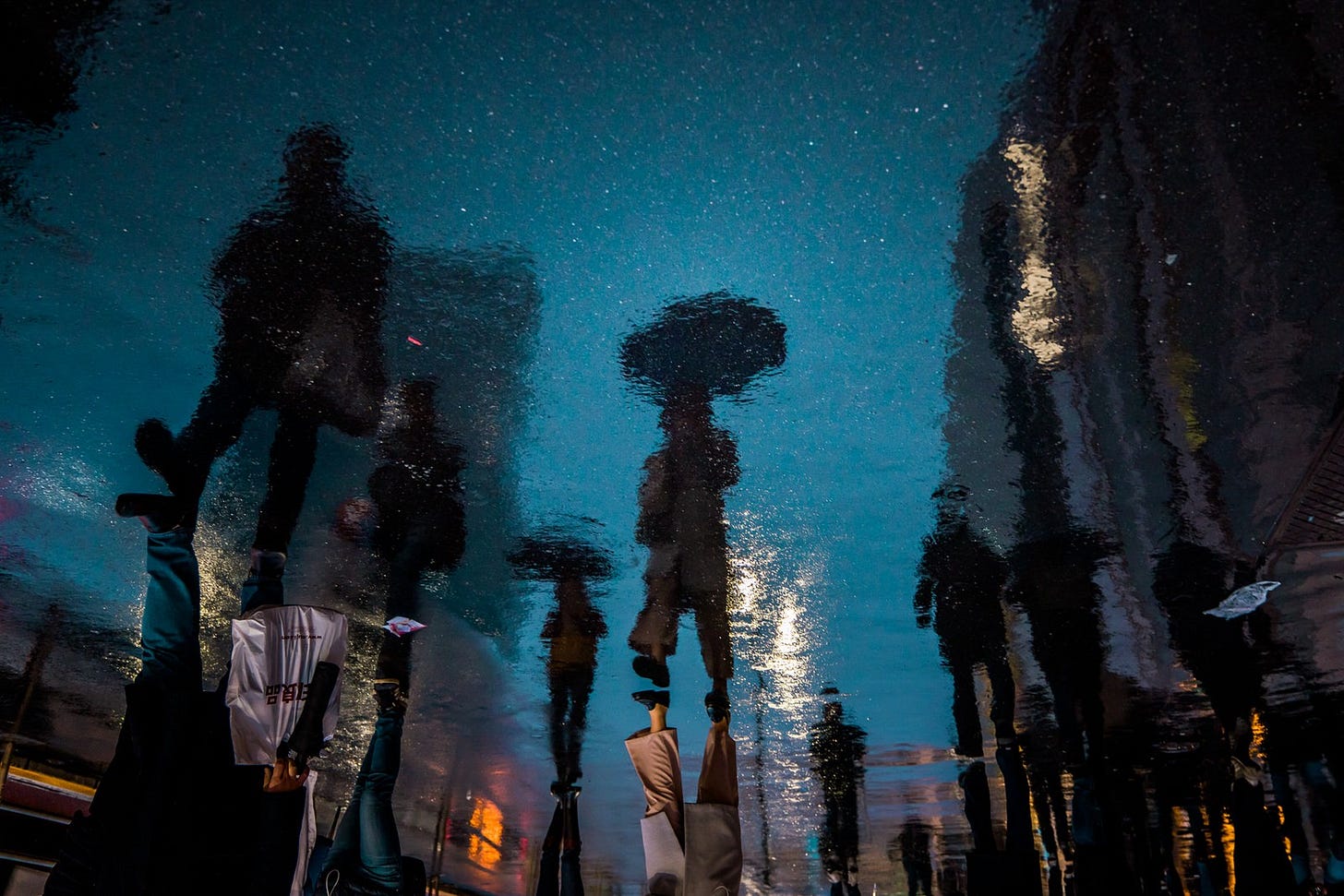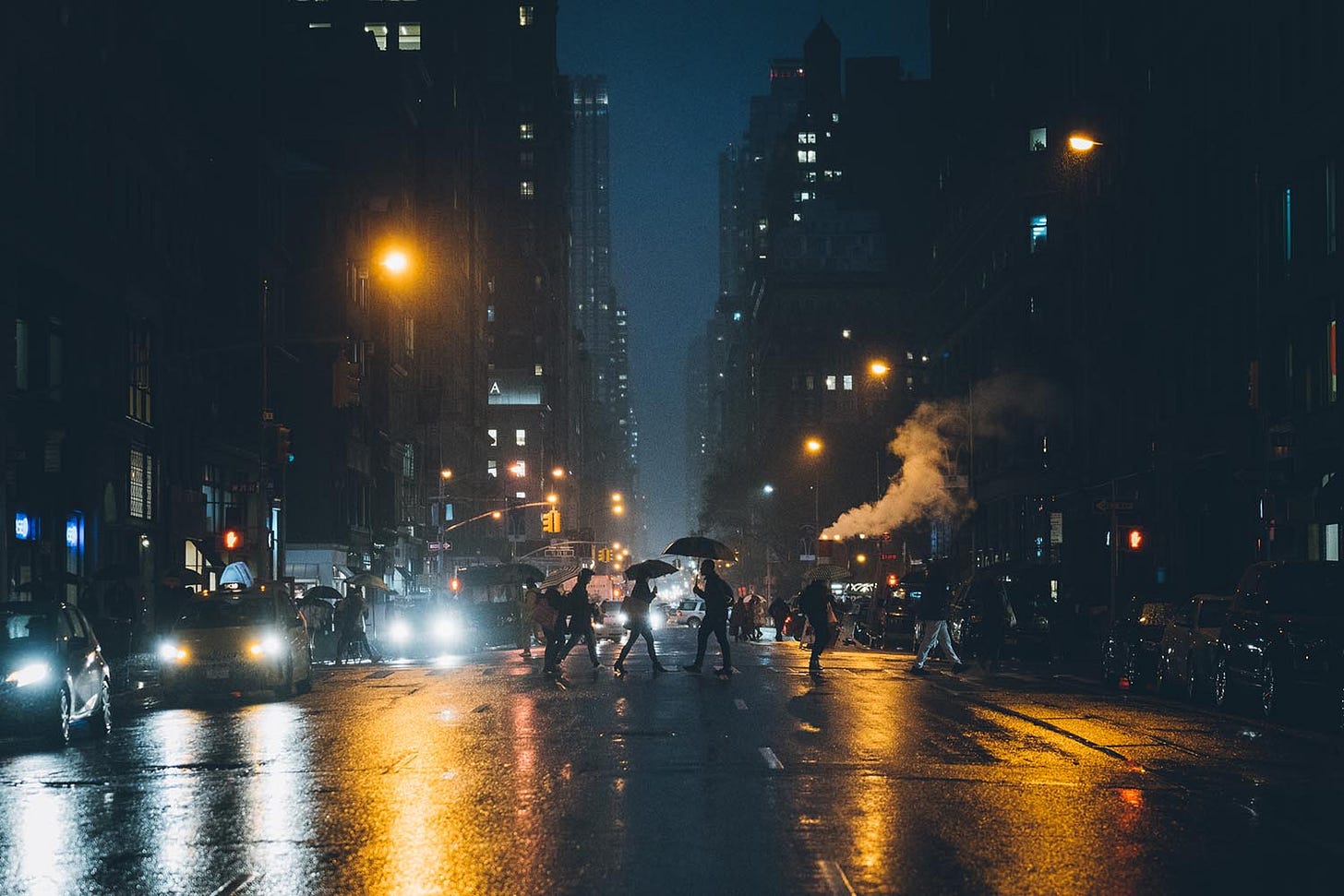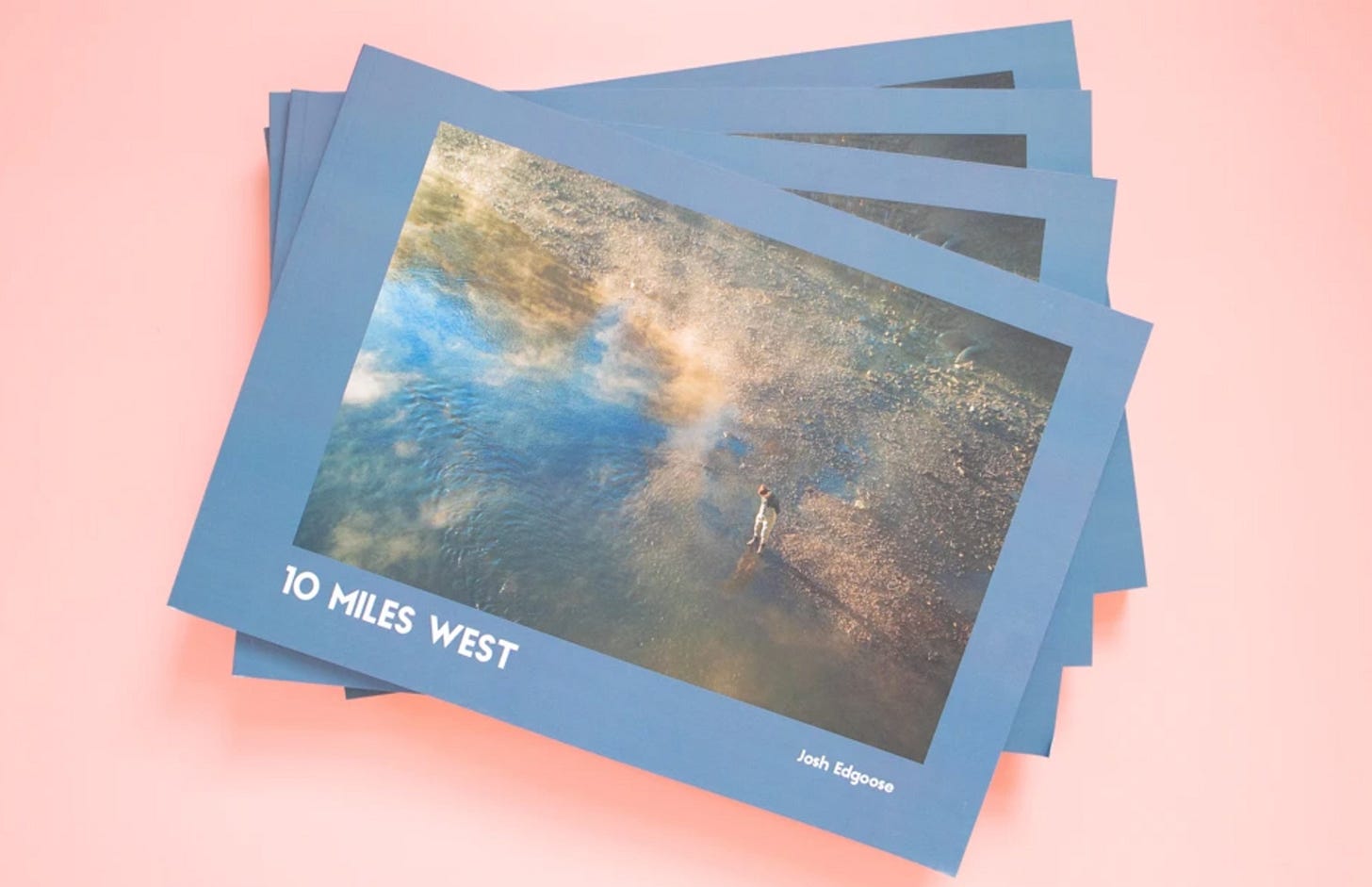Process 019 ☼ Reject the Algorithm, Embrace Your Voice
Giveaway: Josh Edgoose's "10 Miles West" zine
Dear friends,
Today’s letter is about the importance of embracing our own creative voice and not letting an algorithm determine what kind of work we make and share.
I tackle this topic in a conversation with my friend Dave Krugman. In addition to be a great photographer, Dave has a bachelor degree in psychology so when he joined social media he was able to identify the algorithmic tricks that can make it so engaging and even addictive. Dave does not mince words in this conversation.
For this week’s giveaway we have Josh Edgoose’s beautiful zine “10 Miles West”.
The conversation below has been edited for length and clarity. If you’re interested in listening to the full unedited conversation you can check out the 44 minute long recording over on Soundcloud. It’s a simple zoom recording with a bebop intro/outro, which I very much enjoyed making it so let me know if you’d like more and fancier audio as part of the Process in 2021.
Wesley Verhoeve: You recently did a Q&A where one of your followers shared that they felt demotivated by Instagram’s engagement algorithm and asked for your advice on the matter. Could you share how you approached that question?
Dave Krugman: Yeah, absolutely. I think it's a question that consumes a lot of our thinking across the creative spectrum online. We ask ourselves: “How do I tailor my work so it's more popular online?"
I think that's really the wrong attitude because we have to understand what we're dealing with. What we're confronting is the most sophisticated psychological manipulation that has ever been practiced and at the largest scale that it's ever been practiced on. That's what social media is.
Look, these companies, it's not like they just stumbled across something that's popular. They, by design, have created systems which take advantage of all of our psychological weaknesses. That's what the algorithm is. It's a manipulation of human psychology in order to monopolize your attention.
Every second you have that app loaded on your screen, whether it's Twitter or Instagram or YouTube, every millisecond, they make money. When you look away, they start losing money. Your attention is a commodity and they will do anything they can to keep you engaged. They'll be the first one's to admit it.
We live in an attention economy and the algorithms are designed to keep us on the platform. What that means is that there is no benevolence or good-spiritedness involved in these thought processes. They're trying to keep your attention at any cost. If they do something that's good for the world in terms of educating people or bringing them free information, it's despite their goals, not because of their goals. I think it's really important to realize.
WV: When in your journey as a photographer who broadcasts his work on the internet did you catch on to this? Was that something that was clear to you from the start or was it something that you learned later on?
DK: I had the advantage of being a psychology major in college. These platforms started to mature and come into their own during that period in my life. I was on Facebook and Google Plus and Tumblr and all these platforms. Meanwhile, I'm in a behavioral psychology course and we're talking about Pavlovian conditioning. It was like, oh I see what's happening here.
I was also learning about color psychology and realized that there's a reason why the interface on these platforms is blue, like Facebook and Twitter and Instagram. Blue is a very welcoming calming color. It's the color of the sky, the color of the sea. We're evolved to be soothed by blue tones. Meanwhile what color are notifications?
WV: Red. Alert!
DK: Alert. Alarm. Poisonous frogs, berries, fruits, things that as hunter-gatherers, we've been trained to give a special importance to. When I say that the best psychologists in the world are working for these platforms and designing addictive feedback loops, it's not just a casual approach. They are tapping into our evolutionary psychology in a way that can only be described as sinister.
I don't think I was unique in coming to this conclusion. It’s pretty obvious what these companies are doing. But unlike many creative types, I was also being trained in psychology, so immediately it was clear to me what was going on here.
That actually helped me to grow on these platforms because I understood how communities were forming and coalescing around ideas, how to use hashtags, what the underlying structures were of the informational systems that we're engaging and how group psychology really played into that. I did use that to my advantage as well.
WV: Can you give some examples of when you started using that kind of knowledge from the field of psychology for your own work or the way that you shared it?
DK: One of the things that my brand has been built around, especially in the early days, was community building. If I could put myself at the center of a network connecting people and be somebody that helps facilitate those connections, then all that traffic and attention would flow through my page. For me, it was great because I actually love hosting meetups. I love being a connector of people. It was very natural for me to say, "Hey everybody, lets meet up in Washington Square Park and let's hang out and talk about photography.”
I just like doing that stuff. The fact that it put me at the center of a creative community in New York that would meet up around these events I would have, that was a great bonus. Let's say that we have a meet up and two people meet there and become friends. Then multiply that by however many people are there and all these different interactions happening. Now my efforts become the hub of a wheel where all the spokes connect and all that traffic flows through my brand. If you do that over and over again, it's impossible not to build a layered community around that.
WV: That's something you did in the real world. Are there also examples of things you did online, whether it’s when you posted or which captions you used?
DK: Yeah, but the real world example is basically a version of what I do online anyway. We go meet up and take pictures, then we go home and start posting and tagging each other. That's happening online mostly. It helps to solidify those relationships in real life. It's much easier to walk away from somebody you've never met. But if, once you meet somebody, you have a real connection the online relationship is much stronger.
WV: Now you’re pals.
DK: Yeah, now you're pals. That starts online. It moves in person. It goes back online. But yeah, just being present in the community and adding value. I try to be very educational so that it's not just a pretty picture I post. I try share what I'm thinking. Try doing this, try shooting with your phone, etc. If you can become a resource for people, they're going to stick around.
WV: Sometimes I notice folks who end their caption with a question, like “What do you guys think?” That seems like an intentional technique to become the center of a community and at times can feel a bit contrived.
DK: The key to all this stuff is you have to really mean it. There's a difference between doing cynical things for engagement and genuinely putting effort in.
Even the Q & A that sparked this conversation. I genuinely wanted to answer that question. I genuinely wanted to have those conversations with my followers. I'm so glad you asked about the algorithm. Because I really do care and I do want people to realize that you got to put the phone down.
You got to understand that we are in a losing battle. The resources that are going into hacking your brain are so vastly well supported and irresistible, that if you don't make a conscious effort to take back some of your time, you will fall into a terrible loop.
WV: How do you deal with that personally? Having that knowledge but also having gained a lot from being on these platforms. Is that something that from the beginning you were able to have a conscious balance in?
DK: I wish I could sit here and sound like Buddha of social media and be like, I knew that... No, no, no. I only know this stuff because I've fallen victim to it so often. Especially now during this pandemic. All of our social interactions have moved online. I'm somebody who takes the pandemic very seriously, so I'm not going out meeting up with a lot of people. I have a very small group here in New York. It's like our little pod. During this year in particular, I've had to be very vigilant and understand that I'm spending way too much time on my phone on these platforms. I feel it affecting my mental health. 100%. I am less happy the more I'm on social media.
The things I recommend are goals that I'm trying to aspire to myself. One of those things is that if you're on social media, you should be putting stuff into it as well. There's a balance between input and what you're taking from it. If you're just sitting there scrolling and you're just reading other people's lives and absorbing their highlight reels and sitting there in bed miserable, that's a terrible balance to have.
But if you decide, okay if I'm going to be on social media today, I'm going to make something creative and put it out into that world, then you can earn your time on those platforms. I try to be not a looker, not just consuming other people's stuff because I think it's really unhealthy. Our brain is not designed to absorb the best parts of 100 different lives every day.
Meanwhile, you're sitting there in probably one of your low moments because you're on your phone, right? You're not out there living. You're not out there doing these things, so the cognitive dissonance between what you think everyone else is doing and what you're actually doing in that moment can destroy you. It's a terrible way to live.
I just want to say to people, make sure that you realize two things. First of, that's not an accurate depiction of what's going on in the world, everyone's just showing the best of that day. Secondly, you're looking at those moments in moments of quiet and boredom where the comparison is just not accurate. Just be careful with your mind.
WV: If I could summarize what you just say: Okay I get to look at a few things for 10 minutes, but only if I create something first to put out and nurture myself with.
DK: Absolutely. And I wish I could stick to that more. Philosophically, that's how I think it should be. In practice, it's much harder because it's so easy to pull out your phone and just say, oh, a quick little hit of dopamine. This year in particular, I've felt the effects of these systems way more than in previous years. Usually I'm traveling, I'm meeting new people, dining at restaurants and meeting new clients and having all these rich experiences. These rich real world experiences. Now it's just me and my archive and social media.
I wish I could be a bit more disciplined. This conversation is a reminder to lean into that. I think we're in for a big reckoning in the same way that doctors used to recommend cigarettes. We're in that for mental health right now.
WV: Do you use any kind of tools to try to strengthen your self-discipline?
DK: That's a good question. It's funny, I'm just laughing at myself because I set a limit on my cell phone. I think I gave myself two hours total for social media, which for me means Instagram and Twitter. Those are the one's that really get me.
WV: No TikTok?
DK: I don't use TikTok. That one’s even more addictive. What pisses me off about TikTok is the “least common denominator” content. The more simplistic something is, the more it goes viral. The interesting stuff is on the fringes where it's not necessarily the most popular thing, but it's challenging and it stimulates your mind. TikTok celebrates the base. It's just not the direction I want to go.
WV: Would you say that also applies to Instagram? Once people post a certain kind of photo that hits the hardest in terms of likes and validation, it seems inevitable that they will be driven to post more of those rather than develop as photographers.
DK: That's a great point. Don't let an algorithm hijack your creative voice. My style is New York City, street photography, rainy, moody vibes. That's my main bread and butter. Now, when I deviate from that, I don't get as much attention. If I post a portrait, it gets a little bit less attention.
Now, if I'm sensitive to that decrease in dopamine, I'll get nudged back towards the center. If I'm not willing to take that hit, then I will be narrowed and narrowed and the inevitable outcome of this is that I will post exact same type of photo every single day.
You see this happening. The more popular some photographers get, the more narrow their vision becomes because they are unwilling to put something up that they don't get that full hit from. They'll delete it, they'll complain, they'll go to such lengths. Meanwhile, they're letting this algorithm, a piece of computer code with no soul and no opinion, nudge them ever closer to this inevitable canyon that they can never escape from.
I love when I put up something and it doesn't do as well as my other post. At least I'm on the fringes and learning about myself or about new techniques. I'm willing to take those hits. I could have much, much higher engagement and many more followers on Instagram, but it's like a deal with the devil. I'm not willing to make that deal. The easiest way to thrive on Instagram is to do the same exact thing every single day.
WV: Was there a period in time where you went that way and then you pulled yourself back from that? Or were you able to see that when it happened and just cut it short and do a new thing?
DK: It's always a spectrum. I'm still guilty of it. I'm still sticking to my brand. Whether or not you're on Instagram, you develop some sort of brand. There's always some sort of pathway you're working in. I'm just trying to keep my pathway as wide as possible and not letting computer code narrow that to the point where it's just singular. But I'm still definitely playing to my audience and I know what they like to see and what they like to talk about. But I know that if I systematized it and made myself more programmatic, then these computer systems would reward that predictability. But it's taking away the very thing that makes us human. Do not let an algorithm hijack your creative voice, because it's so easy. We're being trained.
If you’d like to listen to the full conversation between Dave and I you can check out the audio recording over at Soundcloud. Things we covered that are not included above are Dave’s wonderful new project AllShips.co which he built in part as a reaction against the algorithm. We also talk about the reason that Instagram switched the default image ratio from square to 4x5, the importance of owning the land you build on, a few more healthy and supportive ways to use Instagram, and more.
Find Dave’s work on DaveKrugman.com, @dave.krugman, and especially AllShips.co.
That’s it for this week, and actually, this year. I am taking off next week for the holidays and will be back with issue 020 on January 3rd, 2021. Wow 2021! Sci-fi!
Thank you for being along for the Process ride in 2020. I appreciate all of you and your kind words and feedback. I love how thoughtful and open you are in giveaway entries and notes. This is a very special community and I am grateful for it. Writing Process and connecting with you all has been a major highlight for me in a challenging year.
Much more coming in 2021, including the pre-order for my photo book Notice. (!!)
In the mean time, keep shooting and take care of yourselves and others.
W
PS More audio in 2021? Yay or nay?
Process Giveaway!
My pal Josh Edgoose is a London-based photographer who recently released a great zine caled “10 Miles West”. He has made available one copy to giveaway for YOU!
To enter email me at hello@wesley.co (please don’t reply to this note but send a separate email) before 11pm EST on December 23rd and answer the following question:
What is one new thing you will try in your creative work next year?
My answer: starting a publishing imprint, building tools to help fellow photographers succeed, and shooting a project on 8x10.
One winner will be randomly drawn and notified via email. This giveaway is for Process subscribers only. Subscribe below by clicking this button:
Make sure to send Josh some love on Instagram and check out his work online.
Would you like to support Process? Great! Tell your friends about it. Just click below:
If you’re a new reader, browse the Process archives here.
Process is a weekly letter from Wesley Verhoeve.
Follow along at @wesley.




